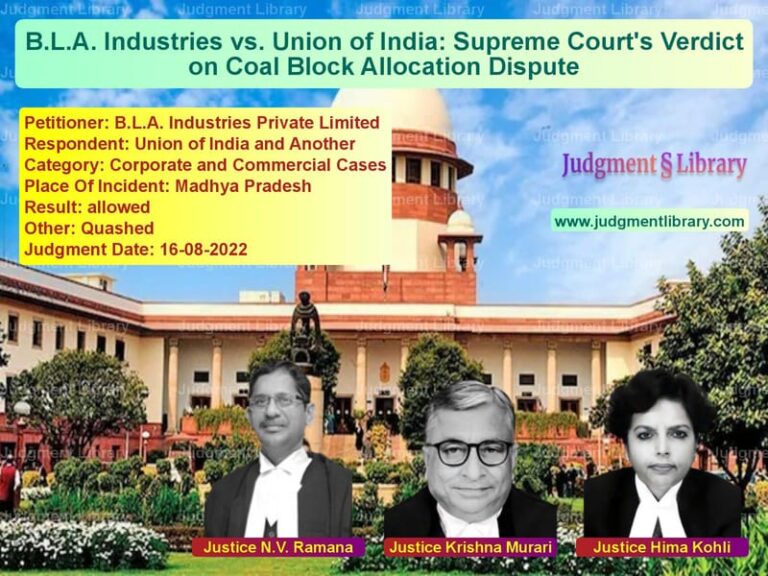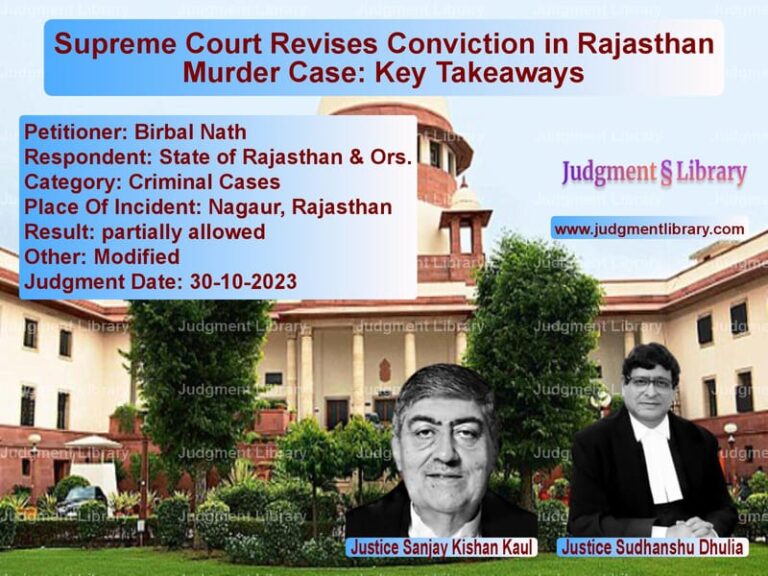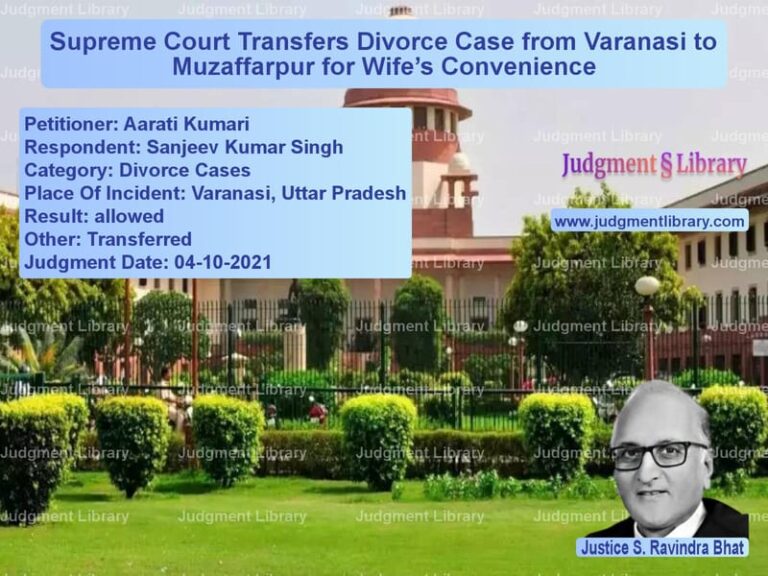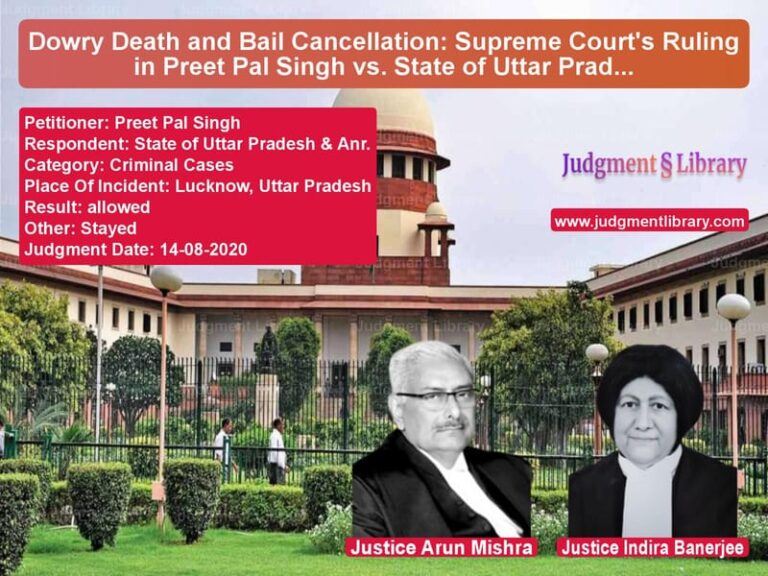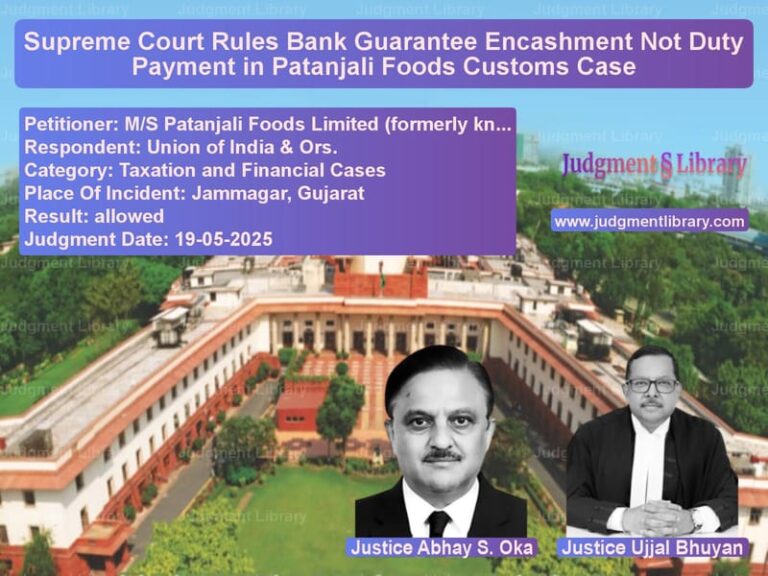Temple Property Dispute: Supreme Court Ruling on Restitution and Possession Rights
The case of Murti Bhawani Mata Mandir Rep. Through Pujari Ganesh Lal vs. Rajesh & Ors. dealt with a long-standing property dispute involving temple land. The Supreme Court of India was tasked with deciding whether the respondents had a right to seek restitution under Section 144 of the Code of Civil Procedure (CPC) after the dismissal of a suit for permanent injunction.
Background of the Case
The dispute arose from agricultural land claimed by the Murti Bhawani Mata Mandir, represented by its pujari (priest), Ganesh Lal. A suit was filed by Ganesh Lal in the Civil Judge, Class II, Sardarpur, seeking a permanent injunction to restrain the defendants from interfering with the temple’s possession of the land.
The key issues framed by the trial court included:
- Whether the land belonged to the temple and was under its possession through its pujari.
- Whether the defendants attempted to illegally take possession of the land and destroy the crops.
- Whether the defendants had any legal claim over the property.
The trial court dismissed the suit on April 11, 1981, ruling that the temple had failed to establish possession over the disputed land. The first appeal before the District Judge and the second appeal before the Madhya Pradesh High Court were both dismissed.
Application for Restitution
Following the dismissal of the suit, the respondents filed an application under Section 144 CPC, seeking restoration of possession and mesne profits. The executing court initially dismissed the application. However, the Additional District Judge allowed the appeal and remanded the case for further proceedings. The appellant then moved the High Court, which dismissed the second appeal in limine.
Arguments by the Appellant
The appellant, Murti Bhawani Mata Mandir, argued that:
- The provisions of Section 144 CPC were not applicable since no possession had been granted through a decree or order.
- Restitution under Section 144 requires that possession was taken pursuant to a decree that was subsequently reversed, which was not the case here.
- Even if the plaintiff had taken possession during the pendency of the suit, an application under Section 144 CPC would not be maintainable.
Arguments by the Respondents
The respondents contended that:
- The appellant had taken possession of the suit land after obtaining an interim injunction.
- Once the suit for injunction was dismissed, they were entitled to seek restitution and regain possession of the land.
- The lower courts had correctly interpreted Section 144 CPC to order restoration of possession.
Supreme Court’s Observations
The Supreme Court examined Section 144 CPC, which states:
“Where and in so far as a decree or an order is varied or reversed in any appeal, revision or other proceeding or is set aside or modified in any suit instituted for the purpose, the Court which passed the decree or order shall, on the application of any party entitled to any benefit by way of restitution or otherwise, cause such restitution to be made as will, so far as may be, place the parties in the position which they would have occupied but for such decree or order.”
The Court noted that restitution requires:
- A decree or order that is reversed or varied.
- A party entitled to benefit from restitution.
- The relief claimed must be consequential to the reversal of the decree.
In this case, the trial court had not passed any decree granting possession to the plaintiff. The interim injunction obtained during the suit did not amount to a formal order placing the appellant in possession. Therefore, Section 144 CPC did not apply.
Final Judgment
The Supreme Court ruled:
“In the present case, the interim order of the Trial court did not require the defendant to hand over possession to the plaintiff. There was no decree or order of the Trial court by virtue of which the appellant was given possession of the property, nor did any decree or order mandate that the respondent hand over possession to the appellant.”
Accordingly, the Court allowed the appeal, setting aside the orders of the High Court and the Additional District Judge. The respondents’ application for restitution under Section 144 CPC was dismissed.
Conclusion
This judgment clarifies the scope of Section 144 CPC and reiterates that restitution is not available when possession was not granted under a judicial decree. The ruling ensures that parties cannot use procedural remedies to bypass substantive property rights.
Petitioner Name: Murti Bhawani Mata Mandir Rep. Through Pujari Ganesh Lal.Respondent Name: Rajesh & Ors..Judgment By: Justice D.Y. Chandrachud, Justice Hemant Gupta.Place Of Incident: Madhya Pradesh.Judgment Date: 21-01-2019.
Don’t miss out on the full details! Download the complete judgment in PDF format below and gain valuable insights instantly!
Download Judgment: Murti Bhawani Mata M vs Rajesh & Ors. Supreme Court of India Judgment Dated 21-01-2019.pdf
Direct Downlaod Judgment: Direct downlaod this Judgment
See all petitions in Property Disputes
See all petitions in Succession and Wills
See all petitions in Judgment by Dhananjaya Y Chandrachud
See all petitions in Judgment by Hemant Gupta
See all petitions in allowed
See all petitions in Quashed
See all petitions in supreme court of India judgments January 2019
See all petitions in 2019 judgments
See all posts in Civil Cases Category
See all allowed petitions in Civil Cases Category
See all Dismissed petitions in Civil Cases Category
See all partially allowed petitions in Civil Cases Category


